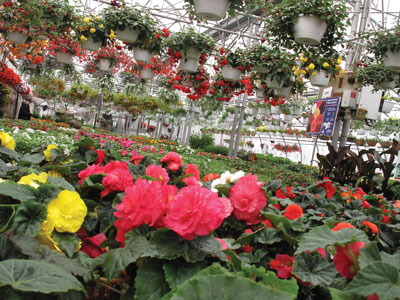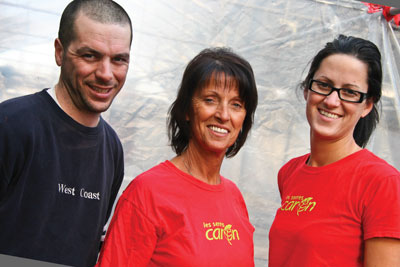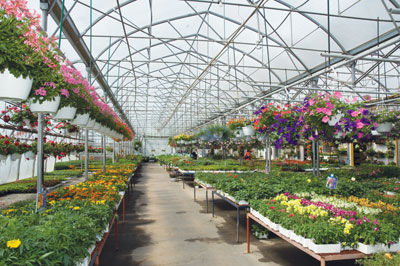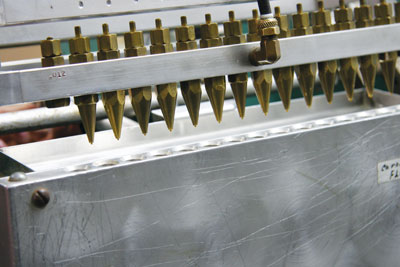
Isabelle Caron was born to be an ornamental grower and marketer.
Isabelle Caron was born to be an ornamental grower and marketer. At age 31, she is a partner in the family business and is determined to help ensure a bright future for the company her grandparents started nearly 60 years ago.
 |
|
| Les Serres Caron grows some 700 varieties. PHOTO COURTESY ISABELLE CARON Advertisement
|
Caron enjoys any opportunity to attend training sessions, and has visited growers in Europe to absorb all that is new in growing crops and marketing. She is also a regular segment host with a Web TV program focusing on the ornamental production!
Staying on top of consumer trends, she says, is as important as growing quality plants.
“Les Serres Caron” is located in L’Islet, about 100 kilometres east of Québec City, and supplies a market within a radius of 200 kilometres, both retail and wholesale.
In business since 1953 – the company will celebrate its 60th anniversary next year – it initially specialized in vegetables that were sold to motorists driving along the nearby highway. For a long time, this was the sole road to the Lower St. Lawrence region, before the construction of Highway 20.
REINVENTING THE BUSINESS WITH A SWITCH TO FLOWERS
■ The Carons subsequently decided to reinvent the business to target new markets and began growing annuals.
From humble beginnings, they expanded in the early 1990s to a total of 45,000 square feet of greenhouses. They now have 60,000 square feet of production.
 |
|
| Jean-François, Denise and Isabelle Caron. PHOTO BY MARTINE FRIGON
|
Les Serres Caron remains a family business with the third generation now involved. Michel and Denise Caron became owners in 1977. It is now run by Isabelle and her brother Jean-François, with help from Denise, Michel unfortunately having passed away in 1999.
In 2004, after her studies in ornamental production at the Institut de technologie agro-alimentaire, (Food Technology Institute), Isabelle became a full-time partner in the business.
Jean-François, who has always worked in the business, is in charge of maintenance and production. “Each of us have a strength, so we complement each other quite well,” he says with a laugh. “To me, things like marketing and public relations are not my cup of tea! I leave this to Isabelle.”
It’s indeed a good working relationship, adds Isabelle. “We have the challenge to continue what our parents and grandparents did, to ensure we keep our reputation for quality plants, and also adapt the business to the new trends that will come over the years,” she says. “But we can still count on our mom, who is still present in the business, and her experience.”
SALES ALMOST EVENLY SPLIT BETWEEN RETAIL AND WHOLESALE
■ They produce around 700 varieties. “About 55 per cent are dedicated to retail and the rest to garden centres, landscapers, institutions and municipalities.”
 |
|
| A long view of one of Les Serres Caron’s greenhouses.
|
Getting advice from specialists is a must for the Carons. “‘My parents have always asked for recommendations from professionals, and especially from the Institut québécois du développement en horticulture ornementale (Québec Institute of Development in Horticulture). In fact, we have worked with the same adviser for a long time. He knows our production and gives us updates on new pest control techniques and products,” says Isabelle.
The greenhouses are managed by a Damatex system. They are heated for the most part by 20 oil furnaces, except for an 8,000-square-foot section heated by a wood furnace.
“We are looking into a biomass heating system, but this is a huge project. We hope that we will have finalized all the administrative arrangements next year,” says Isabelle.
MANY LONG-TERM EMPLOYEES RETURN EACH SEASON
■ In the rush period, from mid-March to the end of June, the business has 25 employees. “Many of them have worked for us for more than 20 years. They live in the surrounding area, and want to stay with us. We are pretty lucky,” says Denise.
Expenses are always under the microscope. They don’t, for example, overproduce with the hope of finding additional buyers during the season. “With wholesale, we only produce from the orders that we have received from our customers, and not more.”
An in-house software program tracks the sales performance of each variety.
Retail production is based on sales the previous year.
“This is more difficult today compared to 30 years ago, when my husband and I took over the business,” says Denise. “Luckily, our commercial and institutional customers have remained the same every year. But our costs are increasing and we cannot pass them on to our customers, so I notice that our margins have decreased.”
GARDEN CENTRE ADDED TO IMPROVE SALES
■ To improve sales, the Carons built a garden centre beside the greenhouses a few years ago. And why a garden centre? “To add something extra,” says Isabelle.
 |
|
| Like father, like daughter? Michel Caron was fond of innovation, and was the first grower in the province to buy an automatic seeder in the mid-1980s.
|
She travelled to England last year with other producers from the province, and found that many growers had to sell accessories, books, and even clothes, associated with gardening to remain in business. “Will we soon face to the same situation here in Québec? I do not know.”
In 1999, when Michel passed away after battling cancer, Denise decided to maintain the business with Jean-François, the older of her children while Isabelle was still at school. “When my husband died, I didn’t want to sell. I wanted to see if my children would be interested to go on in the business. I wanted to be sure to make the right decision.”
And indeed it was the right decision. The siblings have become keen partners in the business and are looking at new opportunities.
“The succession process is not finished since I still have 50 per cent of the business,” Denise explains. “When I retire, we will finalize the arrangements. I have another son, Daniel, who is not involved in the business, but lends a hand during busy periods. It is important to be fair and we will make sure to take the right decisions for all three children.”
NETWORKING WITH OVERSEAS GROWERS
■ To ensure the company remains competitive, Isabelle has been busy networking with growers overseas. “I wanted to see ornamental production elsewhere, and that’s why I went to France and England. I met producers there, saw what they did, and I can ask them for information or advice any time.”
She also enrolled in management and marketing courses. She has completed a certificate in administration and marketing at Université Laval.
Because she is a “product” of the Y generation, Isabelle is a fan of technology. In 2011, she participated as columnist in a Web TV show called “www.melaniegregoire.tv.” Focusing on ornamental horticulture in Quebec, this show was applauded by the Québec agriculture minister for its originality and resourcefulness.
Isabelle has also been chosen to represent the “faces of the countryside” for the campaign, “Make a Garden of Your Life.” This is an industry-wide promotional campaign initiated by the FIHOQ, with the financial support of the Quebec Ministry of Agriculture (MAPAQ). “This is important, since we will make contacts and promote our industry at the same time,” she says.
AN AWARD-WINNING GROWING OPERATION
■ Over the last decade, the Carons have won many awards.
They were recognized for the most beautiful entry of flowers in the 2002 edition of Québec fleurs.
In 2008, Denise won an award in the category “Relève fémine de l’Ordre Nationale du M érite Agricole” for the succession planning for Isabelle.
The same year, just four years after graduation, Isabelle won an award as a young producer from the FIHOQ-Coop Fédérée. The following year both mother and daughter received awards – Denise for her career and Isabelle as young entrepreneur.
But all this success doesn’t happen overnight. It takes hard work and planning. Isabelle has many more projects in mind.
She also wants to start a boutique. This is a big investment and is not related to agriculture. “So, I have to calculate the costs and have to be sure that I will get my money back in a reasonable period of time.”
Denise definitely made the right decision not to sell when Michel passed away. “We are determined to assure a bright future of the family business and keep the legacy of our family,” says Isabelle.
Martine Frigon is a freelance writer and photographer in Québec.
Print this page